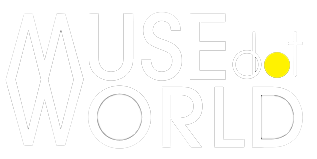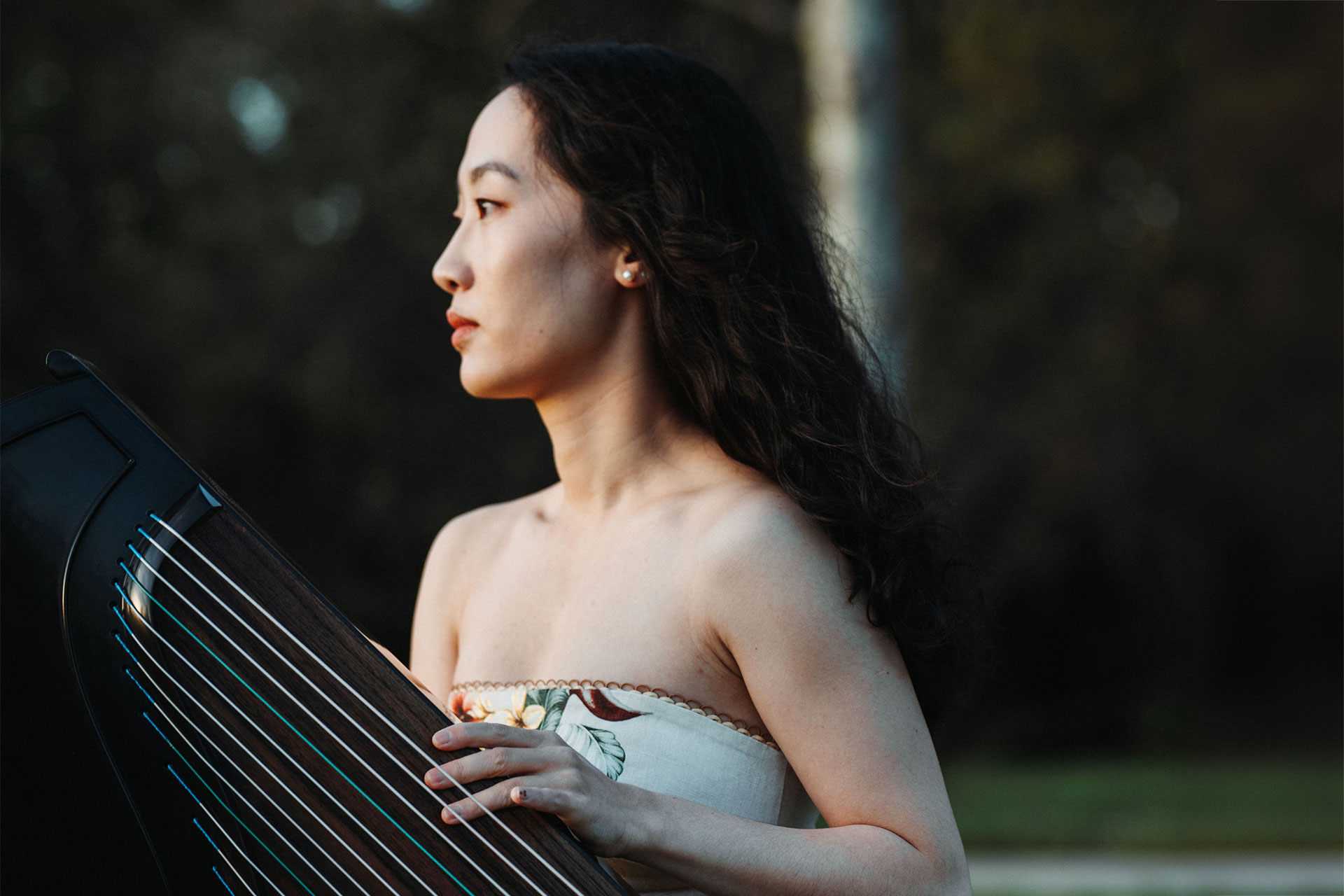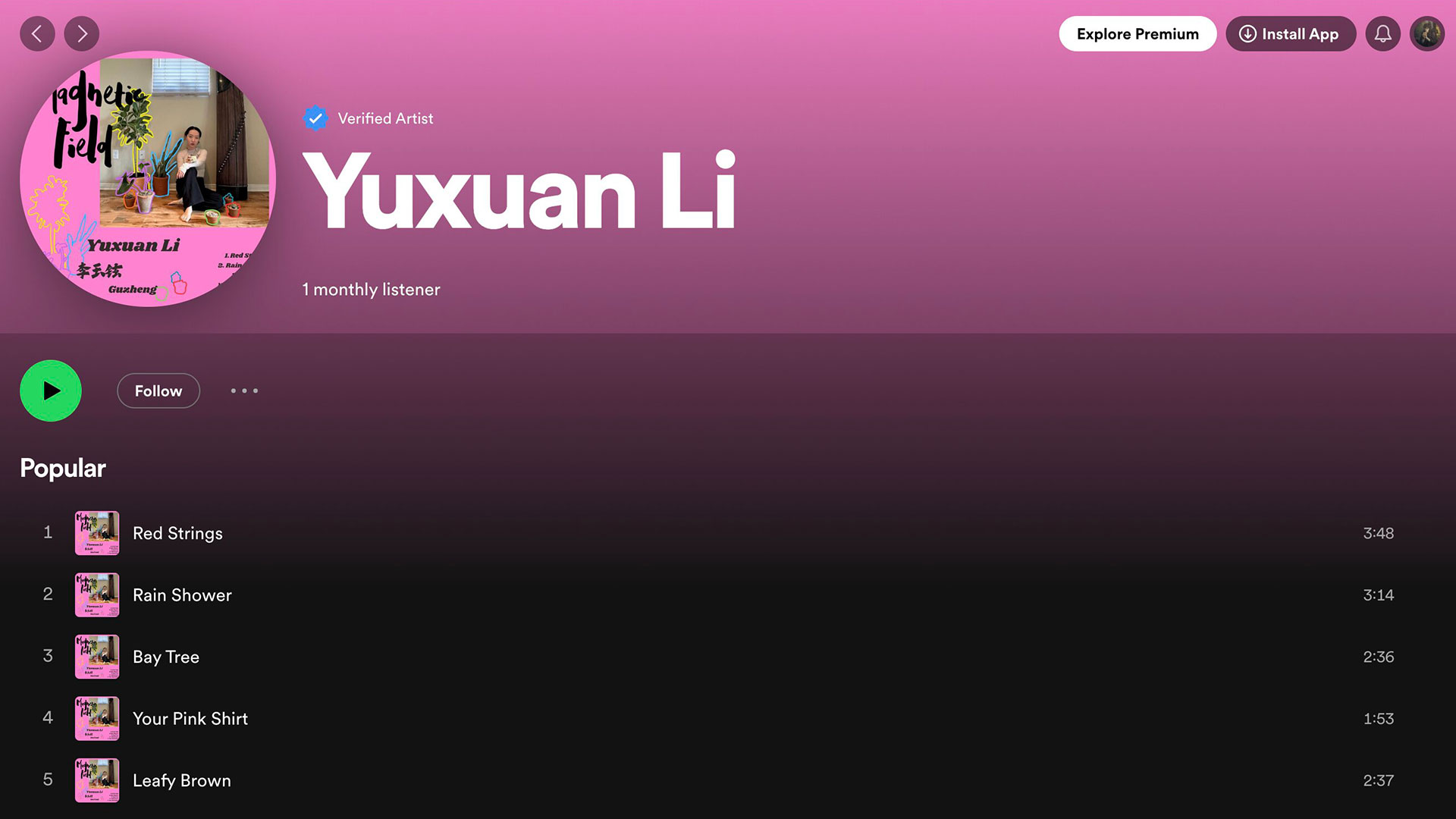Interview with Yuxuan Li from the United States

Interview with Kazutoshi Kawakami for Marionette ballerinas
July 18, 2024
Interview with Robert Fortenberry from the United States
July 18, 2024Yuxuan Li
Yuxuan Li is a multi-instrumentalist specializing in piano and guzheng, a traditional Chinese string instrument with a history spanning 2500 years. In 2023, Li debuted "Magnetic Field," an EP that creatively blends guzheng with modern genres such as Electronic Dance Music, Brain Dance, and Drum & Bass.
Originally from China, I am a multi-instrumentalist specializing in piano and guzheng, a traditional Chinese string instrument with a 2500-year history. My musical journey brought me to the United States, where I now thrive as an independent musician, performer, and educator based in both New York City and Los Angeles.
In 2023, I released my debut EP, "Magnetic Field," a creative fusion of guzheng with modern genres like Electronic Dance Music, Brain Dance, and Drum & Bass. This project represents my dedication to blending ancient Chinese music with contemporary sounds, utilizing innovative production techniques to push the boundaries of guzheng music. As an artist, I am deeply passionate about exploring new musical territories and inspiring others through my work in the dynamic world of global music culture.
My journey into the creative arts was really sparked by my early experiences with the guzheng and the piano. Growing up in China, I was deeply moved by the profound heritage of the guzheng, its distinctive sound capturing my imagination. When I paired this with the universal appeal of the piano, it opened up a whole new world of musical expression for me.
What truly drives me as a creative is the thrill of blending these musical worlds. It's about pushing the guzheng beyond its traditional confines and exploring how it can interact with contemporary music genres. This isn't just about making music; it's about creating a dialogue between cultures, and hopefully, through my work, introducing more people to the beautiful sounds of the guzheng while showcasing its versatility.
So, I suppose what made me choose to become a creative was this passion for exploration and connection—bridging the ancient with the modern, the East with the West, all through music. It's an exhilarating challenge that continues to inspire and motivate me every day.
As an independent musician, I find myself balancing between performance and education, focusing primarily on the guzheng and piano. My days are filled with composing, recording, and performing music, while also sharing my knowledge by teaching these instruments to students of varying ages and backgrounds.
I actively participate in workshops and music events, especially in dynamic cities like New York City and Los Angeles, where I have the opportunity to collaborate with fellow musicians and creatives. These interactions help me stay updated on the latest trends and innovations in the music industry, which in turn, influences my creative process and teaching approach.
In essence, my role as an independent musician and educator is about fostering a deeper appreciation for both traditional and modern music, encouraging cultural exchange, and hopefully, inspiring the next generation of musicians and music lovers.
My creative process starts with a deep respect for the traditional elements I work with, particularly the guzheng. I begin by exploring the intrinsic qualities of the guzheng, understanding its range, timbre, and the emotions it evokes. From there, I think about how these qualities can complement and contrast with modern music genres.
I spend a lot of time in the studio, trying out different sounds, effects, and production techniques to see how the guzheng’s sounds can be manipulated and enhanced to fit into contemporary music landscapes. This often involves digital sound processing, sampling, and layering to create a rich tapestry of sounds that maintain the essence of the guzheng while introducing a new energy and rhythm typical of modern genres.
My cultural heritage is integral to my creative process. Growing up in China, I was surrounded by a rich tapestry of music, art, and history that deeply influenced my appreciation for traditional sounds and instruments, particularly the guzheng. This grounding in traditional Chinese music provides a continual source of inspiration and a foundational element in my work.
In my creative process, I actively seek to incorporate and re-interpret these cultural elements, blending them with the diverse musical influences I've encountered in the United States. This synthesis of the old and the new, the East and the West, not only shapes my musical style but also drives my mission to introduce and integrate the guzheng into modern music genres.
Thus, my cultural heritage doesn't just influence my creativity; it fuels it. It encourages me to explore how traditional Chinese music can resonate within the global, contemporary music scene, and challenges me to create works that are not only musically innovative but culturally enriching.
Thank you! Winning the 2024 MUSE Creative Awards is a significant achievement for me and a reflection of the dedication and hard work put in by my team. This award not only acknowledges our innovative approach to blending traditional Chinese music with modern genres but also validates our commitment to pushing the boundaries of musical expression.
This recognition holds profound meaning for us as it underscores the importance of cultural exchange and innovation in music. It signifies our mission to elevate the guzheng as a relevant and dynamic instrument in today's music industry, showcasing its versatility beyond conventional contexts. Winning this award inspires us to continue exploring new musical landscapes, experimenting with sounds, and creating unique auditory experiences that resonate with global audiences.
On a personal level, this award serves as a validation that our endeavors are both exciting and impactful. It fuels our passion to persist in experimenting and innovating, knowing that our creative risks are valued and celebrated. It’s a source of motivation for the entire team to approach our work with even greater enthusiasm and dedication.
The biggest challenge with this project was the technical aspect of digitally manipulating the guzheng’s sound without losing its essence. However, through extensive experimentation with sound processing and sampling, I was able to overcome this hurdle and ensure that the soul of the guzheng remained intact amidst the electronic layers.
Additionally, I successfully found the right balance where the guzheng not only coexisted but also enhanced these modern genres, overcoming the extensive trial and error process. This required both time and technical finesse, but ultimately, it was a rewarding journey of creativity and innovation.
Winning an award like the MUSE Creative Awards has had a profound impact on my practice and career. This recognition has opened up new opportunities for collaboration and performance, allowing me to connect with a broader network of musicians, producers, and cultural institutions that are interested in exploring the fusion of traditional and modern music.
Professionally, the award has lent a new level of credibility to my work, attracting interest not only from within the music industry but also from educational sectors seeking to include more innovative and culturally diverse materials in their curricula.
On a personal level, the award has been immensely validating. It has encouraged me to continue pushing the creative limits of my musical practice, exploring further how traditional sounds can be reimagined in contemporary contexts.
Cultural Diversity and Exchange: One of the things I love most about the music industry is the incredible diversity of cultures and musical styles it encompasses. It’s a global platform where different musical traditions and innovations come together, creating rich opportunities for cultural exchange. This diversity not only enriches the industry but also expands my own artistic perspectives and practices.
Continual Innovation: The music industry is perpetually evolving, driven by technological advancements and creative breakthroughs. This constant evolution challenges me as an artist to continually adapt and innovate. It’s exhilarating to be part of an industry that is always on the cutting edge, pushing the boundaries of what music can express and achieve.
Community and Collaboration: The collaborative spirit within the music industry is truly remarkable. I treasure the connections I've made with fellow musicians, producers, and educators. These relationships are not just professional; they’re deeply personal and collaborative, fostering a creative synergy that is integral to producing compelling and innovative music. The sense of community in the music industry is a powerful source of inspiration and support for me.
China's unique position in the creative industry can be attributed to several key factors.
Firstly, China's historical depth provides a rich foundation for creativity. With a profound cultural legacy spanning several millennia, China's history influences art, music, and literature. Contemporary artists continuously explore and reinterpret this history, providing a wealth of material that inspires creativity and innovation.
Additionally, China's cultural diversity contributes to its uniqueness in the creative industry. With its vast geographical expanse and numerous ethnic groups, China boasts a tremendous diversity of cultural expressions. This diversity is reflected in traditional arts and crafts, music, and dance forms that vary significantly from region to region. Each of these forms offers unique elements that creators can incorporate into modern expressions, ensuring a rich, evolving tapestry of creative output.
Furthermore, China's rapid technological advancement has significantly impacted its creative industries. From cinema and music to digital art and virtual reality, technological advancements have enhanced the quality and accessibility of creative works while opening new avenues for artistic expression.
In summary, China's historical depth, cultural diversity, and technological advancement collectively contribute to its uniqueness in the creative industry, offering a fertile ground for innovation and artistic exploration.
In these evolving landscapes, there are immense opportunities for artists to lead in innovation, cultural exchange, and social responsibility. As a musician and educator, I am particularly excited about these prospects, as they align closely with my ongoing work of blending traditional and contemporary music forms while engaging with a globally connected audience.
Firstly, increased cross-cultural collaborations offer a platform for artists to explore diverse perspectives and merge different artistic traditions. As globalization continues to bring cultures closer together, I anticipate a rise in hybrid forms of artistic expression. These collaborations not only foster a greater understanding and appreciation of different cultural heritages but also lead to innovative creative outputs that might redefine existing genres and mediums.
Furthermore, the further integration of technology presents exciting possibilities for artists to experiment with new forms of expression and interaction. Technological advancements, such as artificial intelligence, virtual reality, and augmented reality, are poised to transform how art is produced and experienced. For instance, virtual concerts and interactive performances could become more commonplace, offering immersive experiences that were previously unimaginable.
Lastly, sustainability in creativity is becoming increasingly crucial as environmental concerns take center stage. The creative industries are likely to see a shift towards more sustainable practices and messages, whether in the materials used, the themes explored in artworks, or the methods of distribution and consumption. Artists have the opportunity to raise awareness and prompt action on environmental issues through compelling narratives and innovative designs.
Overall, as these landscapes continue to evolve, artists like myself have the opportunity to pioneer new pathways, embracing innovation, fostering cultural exchange, and embracing social responsibility through our creative endeavors.
If you're entering the creative industry or aspiring to submit work to this awards program, I recommend embracing your unique voice to stand out, committing to continuous learning to stay on top of evolving trends and technologies, and building a strong network through collaborations and industry engagement. Don't shy away from experimenting and taking risks with your work, as innovation often requires stepping outside comfort zones.
Additionally, when preparing award submissions, focus on the impact of your work—how it challenges, inspires, or innovates within your field. These strategies not only enhance your skills but also increase your chances of achieving recognition in competitive platforms like the MUSE Creative Awards.
To effectively enhance your skills in the creative industry, I strongly recommend leveraging both networking and learning opportunities from others. Engaging with peers and industry veterans at conferences, workshops, and seminars is invaluable. These interactions not only provide insights into current trends and techniques but also open doors to collaborations that can lead to significant personal and professional growth.
Additionally, joining online forums and communities specific to your field can offer daily access to advice, feedback, and support. Platforms like LinkedIn, industry-specific associations, and social media groups are excellent for connecting with like-minded professionals. Learning from others through these networks, whether by formal mentorship or casual conversations, can dramatically accelerate your development and keep you abreast of new and evolving ideas in the creative sphere.
The cornerstone of my success has always been rooted in perseverance and a relentless pursuit of innovation. For me, combining the rich traditions of the guzheng with the ever-evolving landscape of modern music has involved constant experimentation and, inevitably, facing numerous challenges. The key has been to never stop trying, no matter how daunting the obstacles seemed.
To anyone aspiring to make their mark in the creative industries, my advice would be to embrace the journey with resilience. Never stop learning, experimenting, and pushing the boundaries of your creative expression. Success in our field is not just about talent; it's equally about tenacity and the willingness to keep going despite setbacks.
Yuxuan Li
Yuxuan Li is a multi-instrumentalist specializing in piano and guzheng, a traditional Chinese string instrument with a history spanning 2500 years. In 2023, Li debuted "Magnetic Field," an EP that creatively blends guzheng with modern genres such as Electronic Dance Music, Brain Dance, and Drum & Bass.
Read more about this interview with Wan-Ting Lin from the United States, the Silver Winner of the 2024 MUSE Creative Awards.


